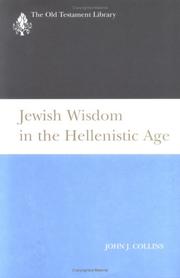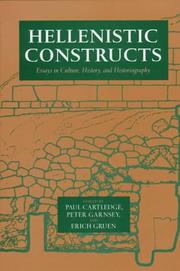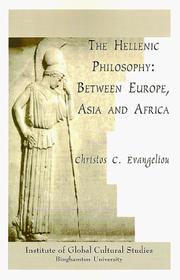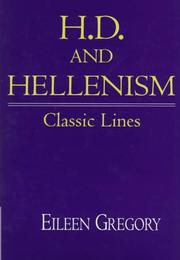| Listing 1 - 10 of 18 | << page >> |
Sort by
|
Book
ISBN: 2130737188 9782130742883 2130742882 9782130737186 Year: 1997 Publisher: Paris : Presses Universitaires de France,
Abstract | Keywords | Export | Availability | Bookmark
 Loading...
Loading...Choose an application
- Reference Manager
- EndNote
- RefWorks (Direct export to RefWorks)
La réponse de Solon à Crésus – nul ne peut se dire heureux avant le terme de son existence – ne s'applique qu'imparfaitement à l'hellénisme, car s'il fut vaincu sur les champs de bataille, davantage d'ailleurs en raison de ses dissensions internes que par la force de ses ennemis, il triompha dans une large mesure dans le domaine de la civilisation. Le premier tome du Monde hellénistique est consacré à la chronologie du monde hellénistique, à la figure du roi et à la guerre, omniprésente depuis la fin du règne d'Alexandre jusqu'à la destruction et la réduction de la Macédoine au rang de province. L'ère des conquêtes ne pouvait s'achever avant la disparition du fougueux Alexandre, tandis que la date de -146 marque la défaite historique de l'hellénisme face à la puissance romaine, alors que les Parthes surpassent déjà presque les Séleucides. Le berceau, la Grèce elle-même, est désormais aux mains des Barbares, et le territoire hellénique se réduit désormais, ironie de l'histoire, à une fraction de l'ancien Empire achéminides, lui aussi abattu par une puissance occidentale. L'hellénisme se caractérise en effet, du point de vue politique, par la monarchie militaire issue de la tradition macédonienne. Le roi n'est ni un basileus revêtu de la majesté attachée aux iera, ni un tyran dressé contre l'oligarchie dont il est issu : il est un chef de guerre. Ce modèle nouveau, auréolé de la gloire de Philippe, plus encore de celle d'Alexandre, conjugué avec le sentiment profond d'une unité du monde hellénique, qui eut un temps un seul maître et possède alors une relative unité culturelle, explique l'état de guerre permanente des Etats issus de l'ancien empire du grand conquérant. Le monde hellénique est organisé, économie comprise, autour du contrôle royal et de la nécessité de soutenir un conflit permanent, ce qui est d'autant plus difficile que les populations autochtones ne s'accommodent pas aisément d'un joug étranger dont seule la terreur permet le maintien. (P. Prigent)
Hellenism. --- Greece --- Civilization

ISBN: 0674051114 9780674051119 Year: 1997 Publisher: Cambridge (Mass.): Harvard university press,
Abstract | Keywords | Export | Availability | Bookmark
 Loading...
Loading...Choose an application
- Reference Manager
- EndNote
- RefWorks (Direct export to RefWorks)
Hellenism --- Hellénisme --- Athens (Greece) --- Athènes (Grèce) --- History. --- Histoire --- Hellenism. --- Hellénisme --- Athènes (Grèce)

ISBN: 0664221092 Year: 1997 Publisher: Louisville Westminster/John Knox Press
Abstract | Keywords | Export | Availability | Bookmark
 Loading...
Loading...Choose an application
- Reference Manager
- EndNote
- RefWorks (Direct export to RefWorks)
Hellenism --- Wisdom --- Biblical teaching --- Pseudo-Phocylides. --- Bible. --- Criticism, interpretation, etc.

ISBN: 0520206762 9780520206762 Year: 1997 Volume: 26 Publisher: Berkeley (Calif.): University of California press,
Abstract | Keywords | Export | Availability | Bookmark
 Loading...
Loading...Choose an application
- Reference Manager
- EndNote
- RefWorks (Direct export to RefWorks)
Hellenism --- Greece --- Mediterranean Region --- Civilization. --- Hellenism. --- Civilisation grecque antique --- Hellenisme --- Hellénisme --- Hellénisme antique --- Hellénisme --- Grèce --- Méditerranée, Région de la --- Civilisation --- Civilization --- Mediterranean region
Book
ISBN: 2218705117 9607256328 Year: 1997 Publisher: Paris : Hatier,
Abstract | Keywords | Export | Availability | Bookmark
 Loading...
Loading...Choose an application
- Reference Manager
- EndNote
- RefWorks (Direct export to RefWorks)
Hellenism
---
Hellénisme
---
Greece
---
Grèce
---
Civilization
---
Influence
---
Civilisation
---
#BIBC:ruil
Book
ISBN: 019813228X 9780198132288 Year: 1997 Publisher: Oxford: Clarendon,
Abstract | Keywords | Export | Availability | Bookmark
 Loading...
Loading...Choose an application
- Reference Manager
- EndNote
- RefWorks (Direct export to RefWorks)
The fortifications built around Greek cities are among the most impressive of ancient remains. McNicoll analyzes and illustrates fortified sites, ranging from Ephesus and Assos on the Aegean to Dura Europus on the Euphrates. These sites provide fascinating evidence of secular classical architecture, as well as insights on the political history of Hellenistic Greece.
Fortification --- Fortification, Greek --- Excavations (Archaeology) --- Hellenism. --- -Excavations (Archaeology) --- -Fortification --- -Fortification, Greek --- -Hellenism --- Greek fortification --- Architecture, Greek --- Classical antiquities --- Fortification, Primitive --- Forts --- Military engineering --- Siege warfare --- Greece --- Middle East --- Antiquities. --- Fortifications --- Fortifications grecques --- Hellenism --- Fouilles (Archéologie) --- Grèce --- Moyen-Orient --- Antiquities --- Antiquités --- Fortification [Greek ] --- Fortification - Greece. --- Fortification, Greek - Middle East. --- Excavations (Archaeology) - Greece. --- Excavations (Archaeology) - Middle East.
Book
ISBN: 8772884306 Year: 1997 Volume: 6 Publisher: Aarhus : Aarhus University Press,
Abstract | Keywords | Export | Availability | Bookmark
 Loading...
Loading...Choose an application
- Reference Manager
- EndNote
- RefWorks (Direct export to RefWorks)
Aristocracy (Social class) --- Hellenism. --- Naval history, Ancient. --- Naval art and science --- Aristocratie --- Hellénisme --- Histoire navale ancienne --- Art et science navals --- Rhodes (Greece) --- Rhodes (Grèce) --- History. --- Histoire

ISBN: 1883058422 Year: 1997 Publisher: Binghamton, N.Y. : Global Publications, Institute of Global Cultural Studies,
Abstract | Keywords | Export | Availability | Bookmark
 Loading...
Loading...Choose an application
- Reference Manager
- EndNote
- RefWorks (Direct export to RefWorks)
Philosophy, Ancient. --- Hellenism. --- Philosophy, European --- Philosophy, Asian --- Philosophy, African --- Philosophie ancienne --- Hellénisme --- Philosophie européenne --- Philosophie orientale --- Philosophie africaine --- Plato. --- Aristotle.

ISBN: 0521430259 Year: 1997 Publisher: Cambridge : Cambridge university press,
Abstract | Keywords | Export | Availability | Bookmark
 Loading...
Loading...Choose an application
- Reference Manager
- EndNote
- RefWorks (Direct export to RefWorks)
American poetry --- -Greek literature --- -Hellenism --- -Women and literature --- -Literature --- Balkan literature --- Byzantine literature --- Classical literature --- Classical philology --- Greek philology --- American literature --- Greek influences --- Appreciation --- -History --- -Bibliography --- H. D. --- -Knowledge --- -Greece --- Greece --- In literature. --- Greek literature --- Hellenism --- Women and literature --- Greek influences. --- History --- Knowledge --- Greece. --- -Greek influences --- Aldington, Hilda Doolittle, --- Helforth, John, --- Doolittle, Hilda, --- D., H. --- HD --- Alton, Delia,

ISBN: 0520918339 058516021X 9780520918337 9780585160214 0520206762 Year: 1997 Publisher: Berkeley University of California Press
Abstract | Keywords | Export | Availability | Bookmark
 Loading...
Loading...Choose an application
- Reference Manager
- EndNote
- RefWorks (Direct export to RefWorks)
The Hellenistic period (approximately the last three centuries B.C.), with its cultural complexities and enduring legacies, retains a lasting fascination today. Reflecting the vigor and productivity of scholarship directed at this period in the past decade, this collection of original essays is a wide-ranging exploration of current discoveries and questions. The twelve essays emphasize the cultural interaction of Greek and non-Greek societies in the Hellenistic period, in contrast to more conventional focuses on politics, society, or economy. The result of original research by some of the leading scholars in Hellenistic history and culture, this volume is an exemplary illustration of the cultural richness of this period. Paul Cartledge's introduction contains an illuminating introductory overview of current trends in Hellenistic scholarship. The essays themselves range over broad questions of comparative historiography, literature, religion, and the roles of Athens, Rome, and the Jews within the context of the Hellenistic world. The volume is dedicated to Frank Walbank and includes an updated bibliography of his work which has been essential to our understanding of the Hellenistic period.
Hellenism. --- Hellenism --- Greece --- Regions & Countries - Europe --- History & Archaeology --- Mediterranean Region --- Civilization. --- ancient greece. --- ancient history. --- ancient literature. --- asia history culture. --- athens. --- complex culture. --- culture ancient near east. --- essay collection. --- fascinating time period. --- greek societies. --- hellenistic history. --- hellenistic period. --- hellenistic scholarship. --- jewish history. --- judaism. --- rich culture. --- rome. --- sociology of the ancient world. --- world history.
| Listing 1 - 10 of 18 | << page >> |
Sort by
|

 Search
Search Feedback
Feedback About UniCat
About UniCat  Help
Help News
News